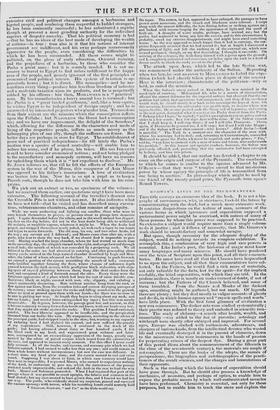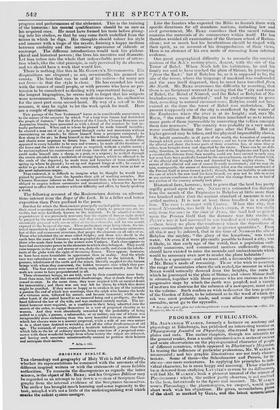GODWIN ' S LIVES OF THE NECROMANCERS.
THIS title conveys an erroneous idea of the book. It is not a bio- graphy of necromancers, who, DI strictness, foretold the future by communicating with the dead, but a much more extensive work. It contains disquisitions on the nature of man, accounts of the various forms in which ignorance and superstition supposed a preternatural power might be exercised, with notices of many of those persons by whom this power was supposed to be practised. So extensive a subject would require more than a single volume to do it justice ; and it follows of necessity, that Mr. GODWIN'A work should be unsatisfactory and somewhat meagre. But space, though necessary fur the adequate display of the subject, would do nothing towards its complete exhibition. To accomplish this, a combination of very high and rare powers is essential. Like Wee's poet, the historian of magic must know many languages and many sciences. He should have pondered over the texts of Scripture upon this point, and all their commen- taries. He must have read all that the Classics have bequeathed to us upon the subject, and all that their commentators have col- lected. In the Fathers, he would find a rich mass of materials, not only valuable for the facts, but for the spirit—for the implicit credulity, the blind superstition, with which they are told. In the profane authors, there is mostly an under current of doubt, if not of sarcasm; but the Fathers of the Church believed, and some of them trembled. From the Saints and Monks of the darkest ages, something might be gathered, but not much. Of legends there are plenty ; but they deal mostly in vulgar accounts of ghosts and dex ils, in which human agency and "mystic spells and words" have little place. With the first faint glimmer of civilization a new sera commences. The darker arts were studied systematically ; their practic was reduced to theory and embodied in scientific. trea- tises. The study of alchemy—a search after health, wealth, and immortality—was added to the list of pursuits; astrology and witchcraft were shortly after enlarged and improved. For several ages, Europe was stocked with enthusiasts, adventueers, and sharpers of various kinds, from the intellectual devotee who wasted life and eventually destroyed it iti the pursuit of chimeras, down to the miscreants who were instruments in the hands of passion for perpetrating crimes of' the deepest dye. During a great part of this period (from about the commencement of the fifteenth to the close of the seventeenth century), the materials are ample if not complete. There are the books of the adepts, the annals of jurisprudence, the biographies and autobiographies of the practi- tioners of the occult sciences, and the charges and lamentations of their opponents. Such is the reading which the historian of superstition should have gone through. But he should also possess a knowledge of mechanics, of acoustics, and perhaps of optics, to enable him to expose the probable means by which well-authenticated miracles have been perfortned. Chemistry is essential, not only for these purposes, but to enable him to track the stens and explain the
progress and performances of the alchemist. This is the training of the historian: his mental qualifications should be as rare as his acquired ones. He must have formed his taste before plung-
ing into his studies, so that he may come forth undefiled from the mines in which he digs. His thoughts should colour his style
and manner with a tinge of the mystic, forming a happy medium between credulity and the intrusive appearance of ridicule or contempt. The different introductions would task his philoso- phical and historical powers ; the lives his narrative and dramatic. Let him infuse into the whole that indescribable power of attrac- tiou which, like the vital principle, is only perceived by its absence, and we should have a work that would live.
There is nothing like this in Mr.Goiewises Necromancers. His disquisitions are eloquent ; so am, occasionally, his general ac- counts. The best that can be said of his notices—for many are Dot lives—is that the style is clear. He has crowded his work with the names of small people, or with persons who have no pre- tension to be considered as dealing with supernatural beings. In the longest biographies, he seems half to forget that his subjects were necromancers. Unless in very obvious cases, his authorities for the most part seem second-hand. By way of a set-off to this censure, it may be right to let the work speak for itself. Here are a couple of specimens.
This passage of the New Testament" leaves us in considerable uncertainty as to the nature of the sorceries by which "of a long time Simon had bewitched the people of Samaria." But the Fathers of the Church, Clemens Romanus and Anastasius Sinaita, have presented us with a detail of the wonders he had ac- tually performed. When and to whom be pleased he made himself invisible; he created a man out of air • he passed through rocks and mountains without encountering an obstacle ; fie threw himself from a precipice uninjured; he flew along in the air ; he flung himself in the fire without being burned. Bolts and chains were impotent to detain him. He animated statues, so that they appeared to every beholder to be men and women ; he made all the furniture of the house and the table to change places as required, without a visible mover ; he metamorphosed his countenance and visage into that of another person ; he could make himself into a sheep, or a goat, or a serpent ; he walked through the streets attended with a multitude of strange figures, which he affirmed to be the souls of the departed ; he made trees and branches of trees suddenly to spring up where be pleased ; lie set up and deposed kings at will ; he caused a sickle to go into a field of corn, which, unassisted, would mow twice as fast as the most industrious reaper.
Thus endowed, it is difficult to imagine what he thought lie would have gained by purchasing front the Apostles their gift of working miracles. But Clemens Romanus informs us that he complained that, in his sorceries, he was obliged to employ tedious ceremonies and incantations ; whereas the Apostles appeared to effect their wonders without difficulty and effort, by barely speaking a word.
The following account of the Rosicrucians derives an adventi- tious interest from the Rape of the Lock. It is a fuller and better exposition than POPE prefixed to the poem.
But that for which the Rosicrucians principally excited public attention, was their creed respecting ceitain elementary beings, which to grosser eyes are in- visible, but weie familiarly known to the initiated. To be admitted to their acquaintance it was .previously necessary that the organs of human sight should In purged by the universal medicine, and that certain glass globes should be chemically prevareil with one or oth,r tithe for.r elene•lits, and Mr one month exposed to the beams of the sun. These pieliminary steps beMg taken, the ini- tiated immediately lint a sight of innumerable beings of a luininoua substance, but of thin and evanescent structure, that people the elements on all sides of us. Those who inhabited the air were called Sylphs; and those who dwelt in the earth bore the name of Gnomes; such as peopled the fire were Salamanders ; and those who made their home in the waters were Undiues. Each class appears to have had an extensive power in the elements to which they belonged. They could raise tempests in the air and storms at sea, shake the earth, and alarm the inhabi- tants of the globe with the sight of devouring flames. These appear, however, to have been more formidable in appearance than in reality. And the whole race was subordinate to mau, and particularly subject to the initiated. The gnomes, inhabitants of the earth and the mines, liberally supplied to the human beings with whom they conversed, the hidden treasures over which they pre- sided. The four classes were some of them male, and sonic female ; but the fe- male sex seems to have proptmderated in all. These elementary beings, we are told, were by their constitution more long- lived than man, but with this essential disadvantage, that at death they wholly ceased to exist. In the mean time, they were inspired with an earnest desire for immortality ; and there was one way left fur them, by which this desire might be gratified. If they were so happy as to awaken in any of the initiated a passion the end of which was marriage, then the sylph who became the bride of it virtuous man, followed his nature, and became immortal ; while on the other hound, if she united herself to an immoral being and a profligate, the hus- band followed the law of the wife, and Was rendered entirely mortal. The ini• tiated however were required, as a condition to their being admitted into the secrets of the order, to engage themselves in a vow of perpetual chastity as to Women. And they were abundantly rewarded by the probability of being united to a sylph, a gnome, a salamander, or an undine' any one of whom was inexpressibly more enchanting than the most beautiful woman, in addition to which her charms were in a manner perpetual, while a wife of our own nature is in a short time destined to wrinkles, and all the other disadvantages of old age. The initiated, of course, enjoyed a beatitude infinitely greater than that which falls to the lot of ordinary mortals, being conscious of a perpetual com- merce with these wonderful beings from whose society the vulgar are debarred, and having such associates unintermittedly anxious to perform their behests and anticipate their desires.
• Acts. c. viii.























 Previous page
Previous page